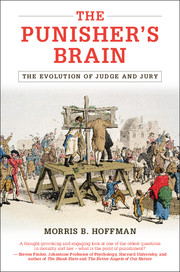Book contents
- Frontmatter
- Contents
- Acknowledgments
- Introduction
- 1 The Most Original of Original Sins
- 2 Detecting and Blaming
- 3 First-Party Punishment: Conscience and Guilt
- 4 Second-Party Punishment: Retaliation and Revenge
- 5 Third-Party Punishment: Retribution
- 6 Forgiveness and Its Signals
- 7 Delegating Punishment
- 8 Legal Dissonances
- 9 Evaluating Some Process Dissonances
- 10 Into the Gap: Evaluating Some Substantive Dissonances
- 11 Brains Punishing Brains
- Index
- References
8 - Legal Dissonances
Published online by Cambridge University Press: 05 May 2014
- Frontmatter
- Contents
- Acknowledgments
- Introduction
- 1 The Most Original of Original Sins
- 2 Detecting and Blaming
- 3 First-Party Punishment: Conscience and Guilt
- 4 Second-Party Punishment: Retaliation and Revenge
- 5 Third-Party Punishment: Retribution
- 6 Forgiveness and Its Signals
- 7 Delegating Punishment
- 8 Legal Dissonances
- 9 Evaluating Some Process Dissonances
- 10 Into the Gap: Evaluating Some Substantive Dissonances
- 11 Brains Punishing Brains
- Index
- References
Summary
People crushed by laws have no hope but to evade power. If the laws are their enemies, they will be enemies of the law.
Edmund BurkeThe Naturalistic Fallacy: Mind the Gap
As any trial lawyer or trial judge will tell you, there are a handful of cases where the law requires jurors to follow rules that seem especially hard for them to follow. These are not cases about difficult factual determinations, such as whether the sex was consensual in a “he-said/she-said” rape case, or even whether a defendant had a certain required state of mind. Instead, there are some legal rules that jurors have trouble with because they just don't seem to believe in them. Blackstone's “pious perjury” is an example. Jurors in sixteenth- and seventeenth-century England simply did not believe that citizens should be put to death for certain relatively minor crimes, and therefore regularly acquitted them of the charged crime and convicted them of a less serious crime that did not carry the death penalty.
- Type
- Chapter
- Information
- The Punisher's BrainThe Evolution of Judge and Jury, pp. 251 - 271Publisher: Cambridge University PressPrint publication year: 2014



